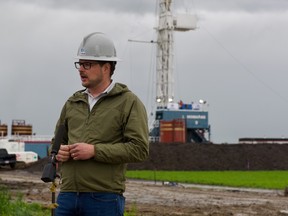E3 produces the first battery with lithium mined in Alberta

.
Amid ongoing supply chain issues and increasingly urgent calls to develop a national market for electric vehicle batteries, an Alberta company is showing that the province has what it takes to make lithium batteries right here at home. .
Announcement 2
.
In June, E3 Lithium completed a pilot project with technology partner Pure Lithium to create a pouch battery using lithium extracted from Alberta’s brine fields in the Leduc Formation.
For Chris Doornbos, CEO of E3 Lithium, the pilot represents an exciting proof of concept advancing his Clearwater Project, which is partially funded by Imperial Oil Limited. Imperial’s discovery of crude oil at Leduc No. 1 in 1947 transformed Alberta’s economy. Of little economic interest at the time was Leduc’s extensive underground pool of lithium-rich brine, which contains a key element that is now helping to power the transport of the future.
.
The battery made last month is more than just an Alberta first: It’s also the first battery produced by Pure Lithium from lithium concentrates that aren’t produced in a lab.
Announcement 3
.
E3 is currently expanding a larger-scale pilot plant in Clearwater while drilling the province’s first lithium wells to demonstrate that its advanced direct lithium extraction technology, using a proprietary adsorbent, will work on a commercial scale. Employing a small footprint, the plant would employ a closed-loop system to bring brine to the surface, extract lithium, and then reinject it into the brine pool within a few hours.
.
“By building the plant from scratch, we have opportunities to do more than extract lithium,” says Doornbos. “Once mined, lithium must be carefully packaged so it doesn’t oxidize and become useless. We think it would make more sense to avoid that step and manufacture the battery cells here.”
Announcement 4
.
The plant would initially produce battery-grade lithium hydroxide to support LiOH battery manufacturing, but could also pivot to producing next-generation lithium metal batteries as the electric vehicle manufacturing market matures.
Alberta offers other economic advantages to support domestic electric vehicle battery production, including an established framework for permits and licenses, existing oil and gas infrastructure, technical expertise, and skilled local labor.
“But it starts with the fact that Leduc is a world-class lithium reservoir,” says Doornbos. “To put that in perspective, Albermarle, the world’s largest lithium company, produces 80,000 tons a year across all of its projects. Based on our brine samples, we believe we could eventually produce at a rate of 150,000 tons per year for 35 years. The commercialization of lithium production in western Canada by E3 and other companies would put us on the map as a major lithium jurisdiction.”
This story was created by Content Works, the commercial content division of Postmedia.
